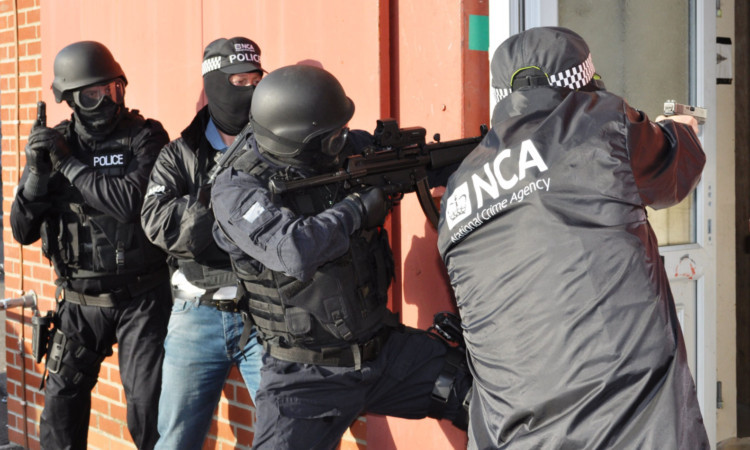A new agency to tackle organised crime in the UK has been launched. Jack McKeown spoke to one of the directors of “Britain’s FBI”.
From this week, Britain has a new crime-fighting body. The National Crime Agency (NCA) was launched in a blaze of publicity. Billed as a British version of the FBI, the NCA will “relentlessly pursue” organised criminals, according to Home Secretary Theresa May, who set up the unit.
Although headquartered in London, the NCA will have a base at Police Scotland’s new Scottish Crime Campus at Gartcosh, due to open this year.
However, this is the third time since 1998 that an organised crime body has been set up. The National Crime Squad was founded then, only to be replaced eight years later by the Serious Organised Crime Agency (SOCA).
It in turn has now been scrapped and replaced by the NCA. In addition to SOCA’s duties, the NCA will also target areas including economic and cybercrime, border policing and child protection. It will work with all of the UK’s regional police forces, Police Scotland, and organisations abroad.
Despite having a much wider remit than its predecessor body, the NCA has no more funding and Labour have called its creation a rebranding exercise.
Gordon Meldrum is the director of the NCA’s Organised Crime Command section. The 47-year-old Scot joined Strathclyde Police in 1985 and spent time in uniform, the CID and Special Branch.
He spearheaded the Scottish Police Service security operation for the G8 Summit at Gleneagles, taking command of 13,000 officers and other “assets”. Meldrum also spent a year with the FBI at its headquarters in Quantico, Virginia.
Although the UK is a very different environment to the United States, he says describing the NCA and a British version of the FBI is a helpful comparison.
“We will be tackling serious and organised crime in a similar role as the FBI carries out at federal level,” he explains. “We have a much broader remit than SOCA. We cover border crime, economic crime and cybercrime. And we’re a 24/7, 365-days-a-year operation.”
This is the second major change to policing in Scotland this year. In April Scotland’s eight regional forces were disbanded and Police Scotland took over control of all the country’s police resources. Meldrum says Police Scotland will be one of the NCA’s major partners.
“Police Scotland are, by anyone’s standards, one of the most major strategic forces in the UK. They are second only to the Metropolitan Police in terms of size. They are twice as big as Greater Manchester or the West Midlands and other large forces. Their capacity to deal with crime in Scotland is second to none.
“There will be times when Police Scotland taps into our resource we may supply cybercrime officers or kidnap and extortion specialists to help with one of their operations or we may request Police Scotland officers to supply manpower for an operation we are running.
“We are also acutely aware of Scotland’s unique legal system and the role of the Lord Advocate. Our officers will be tailoring their operations in Scotland to that legal framework.”
The new agency will also have around 120 officers based in 40 countries.
“Crime is global these days,” he continues. “Organised crime is a network and you need a network agency to combat it.
“We have resources across the globe and Police Scotland will be able to tap into them.”
Asked what will be the most challenging form of crime to tackle, Meldrum says: “Cybercrime is very difficult.
“It is a particularly insidious thing that moves crime from the public into the private domain. You can be lying asleep in bed at night and some clever individual on the other side of the world is stealing your identity. By the time you wake up in the morning they can have committed £100,000 of cybercrime.”
Police Scotland has been highly criticised by news organisations for not being proactive in releasing information on crimes, and for dragging its heels when asked for specific information.
The NCA has pledged to be more transparent than its predecessor body. How will it ensure the public knows about its successes and its failures?
“Yesterday was a big day for the NCA. There was loads of publicity about the agency being launched. That will not be the last you hear about us. Our director general, Keith Bristow, has committed to full transparency.
“Our remit is to reduce the level of organised crime and criminality in the UK. Whether we succeed or fail will be played out in the public eye.”
Playing up its role more publicly is a deliberate tactic, Meldrum insists: “If you are a good, law-abiding person we want you to be reassured that we are out there.
“If you are a bad person who does bad things to good people, we want you to be very afraid of us. If you’re involved in serious crime, we want you to be looking over your shoulder.
“Our intention is that you won’t be able to sleep at night for fear your front door will come crashing down and we’ll be there to bring you to justice.”
